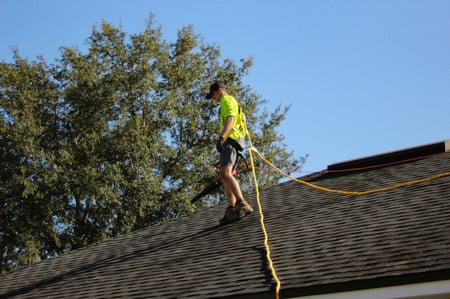Will My Pool Heater Be Removed During My Roof Replacement?
January , 2024 | 6 min. read

When it comes to roof replacements, homeowners often encounter various considerations beyond just the roof itself. If you’re a pool owner, besides the fact that I am extremely jealous, one consideration involves the potential need to address connected structures, like the heater, that may be affected during the replacement process.
If your heater happens to be mounted on your roof, the decision to remove it during a roof replacement isn't universal and depends on several factors. At RoofCrafters, we know that safety, accessibility, and the potential for damage often influence whether disconnecting or temporarily removing the pool heater becomes necessary.
So, if you’re due for a roof replacement, and you’re curious if your heater may need to be removed during your upcoming roofing service, you’re in the right place! Stick around to learn if it needs to be removed and why, who is responsible for this service, the cost, and your next steps. Let’s jump right in!
Will My Pool Heater Be Removed During My Roof Replacement?
During a roof replacement, it's common for certain elements connected to the roof, such as vents, chimneys, or even solar panels, to be temporarily disconnected or removed to ensure the roof replacement process can be carried out effectively. The same might apply to a pool heater if it's directly affixed to the roof or if its connections run through the roofing area being replaced.
chimneys, or even solar panels, to be temporarily disconnected or removed to ensure the roof replacement process can be carried out effectively. The same might apply to a pool heater if it's directly affixed to the roof or if its connections run through the roofing area being replaced.
If your pool heater is directly connected to the roof, it's advisable to have a specialist, like a pool technician or someone familiar with the heater, oversee its disconnection and reconnection to ensure it's done properly and without damage.
It's crucial to discuss this with the roofing contractor before the replacement begins. They can provide specific details about how they plan to handle any connected devices or structures on the roof. In some cases, they may have the expertise to work around such items without removing them completely, but this can vary based on the complexity of the roof and the heater's installation.
Why Would My Pool Heater Need to Be Removed?

While not every pool heater needs to be removed during a roof replacement, there are situations where it might be necessary or advisable:
.png?width=1200&height=200&name=Recommended%20Reading%20(71).png)
Safety reasons: Pool heaters often have gas or electrical connections. During a roof replacement, the workers might need to disconnect power sources or gas lines for safety purposes.
Space and access: Roofers might require clear access to the entire roof surface. If the pool heater is obstructing their workspace or complicating their movement, they may recommend temporarily removing it.
Protection from damage: Roof replacements involve debris, tools, and heavy materials being moved around the roof. Pool heaters, especially those near the area being worked on, could be at risk of damage during the roof replacement process.
Roof integrity: Sometimes, pool heaters are attached in a way that might affect the integrity of the roof if they're not temporarily removed. Roofers might suggest removal to ensure they can properly install or replace roofing materials without causing damage to the heater or the roof itself.
Efficiency: Removing certain elements connected to the roof might facilitate a smoother and more efficient roof replacement process, allowing roofers to work without any hindrance or complications.
The decision to remove a pool heater during a roof replacement typically depends on the specific circumstances of your roof, the type of heater you have, and the approach of the roofing professionals. Consulting with both the roofing contractor and a specialist familiar with your pool heater will help determine whether removal is necessary and how to handle it to ensure the safety of both the roof replacement and the pool heating system.
Will My Roofer Remove My Pool Heater and Re-Install It?

Roofers typically focus on the roofing system itself and may not specialize in removing or reinstalling pool heaters. However, they might handle disconnecting the power or gas lines connected to the heater to ensure safety during the roof replacement process.
In many cases, it's advisable to hire a specialized technician or contractor who deals specifically with pool heaters to disconnect and reinstall the unit properly. This ensures that the pool heater is handled with the necessary expertise and care to avoid damage or improper reinstallation, which could lead to operational issues or safety hazards.
It all boils down to communication. Your roofer can provide information on how they plan to work around the pool heater, while the pool heater specialist can advise on the proper disconnection and reinstallation process. Coordination between these professionals will help ensure the smooth and safe handling of your pool heater during the roof replacement.
How Much Will This Service Cost?

The cost of removing and reinstalling a pool heater during a roof replacement can vary significantly based on several factors:
Type of pool heater: Different types of pool heaters (gas, electric, solar) have varying complexities in terms of installation and removal.
Roof accessibility: The ease or difficulty of accessing the pool heater from the roof can impact the cost. If it's easily reachable, the cost might be lower compared to a more challenging or complex setup.
Labor costs: The cost of labor varies depending on your location, the expertise required, and the contractor's rates. Specialists for pool heaters might charge differently from roofing contractors.
Additional materials or services: Sometimes, additional materials or services might be needed, such as new piping or adjustments to accommodate the reinstallation. These can add to the overall cost.
Condition of the heater: If the pool heater needs repairs, maintenance, or adjustments during the reinstallation process, it can add to the cost.
To get an accurate estimate, it's recommended to:
- Consult with several different roofing contractors for their plans and potential costs for handling the pool heater during the roof replacement.
- Seek quotes or estimates from pool heater specialists or technicians who can specifically handle the disconnection and reinstallation.
Pool Heater Removal During Your Roof Replacement
Whether or not your pool heater needs to be removed during a roof replacement depends on various factors. Roofing contractors may need to disconnect power sources or gas lines connected to the heater for safety reasons. Additionally, if the heater obstructs the roofers' workspace or poses a risk of damage during the replacement process, removal might be necessary.
However, the actual removal and reinstallation of the pool heater may require the expertise of a specialized technician familiar with pool heating systems. Coordination between the roofing contractor and a pool heater specialist can ensure a smooth process, safeguarding both the roof replacement and the proper functioning of the pool heater.
The specific circumstances of your roof and the type of pool heater you have will dictate whether removal is needed and the associated costs involved. Consulting with a professional, like RoofCrafters, will provide a clearer understanding of the necessity, process, and potential expenses involved in handling your pool heater during the roof replacement!
My name is Cassie, and I’m the Content Manager here at RoofCrafters. I was born and raised in Chicago, Illinois, and made my way out to Florida post-college graduation. I’m incredibly passionate about writing and creating valuable content that helps others with the collaboration of my marketing team. When I’m not working, I enjoy shopping (a little too much), spending time at the beach, and reading!



